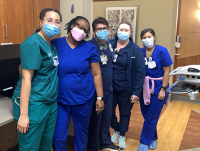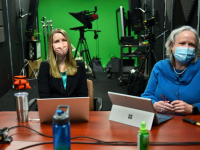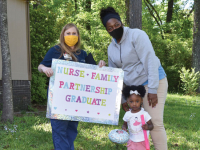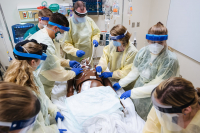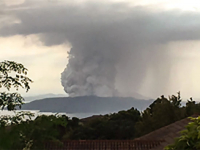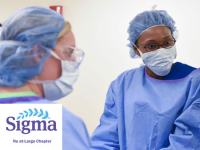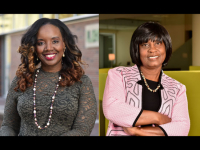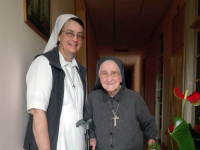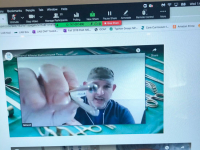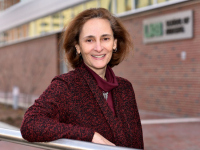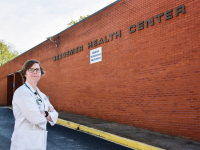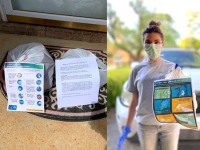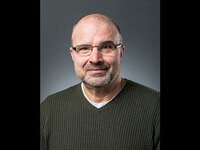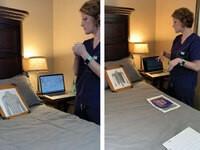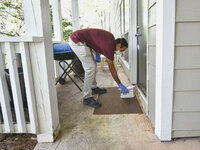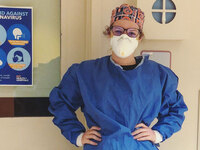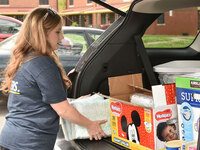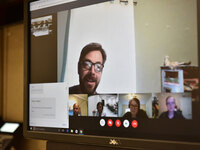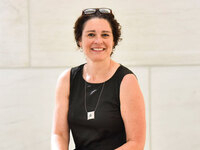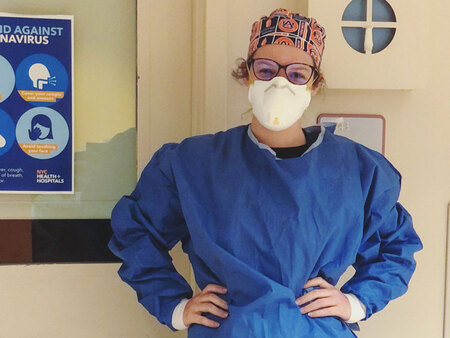 By Erica Techo
By Erica Techo
Every day, Alexis Blackmon wakes up, climbs on a charter bus and travels to a hospital in the New York City health care system. She works a 12-hour shift, returns to her hotel, showers and goes to bed.
“And then we do it all over again,” said Blackmon, a 2016 Bachelor of Science in Nursing (BSN) graduate from the University of Alabama at Birmingham School of Nursing.Her schedule will look the same for 21 days straight.
Blackmon is a travel nurse, and she was one of 90,000 retired and active health care workers that responded to the call for help fighting the novel coronavirus (COVID-19) in New York. Typically, she accepts assignments two to eight weeks before they begin.
“With this situation being a crisis, I flew out within 48 hours and came to New York City,” Blackmon said. “I had one day of meetings and then started the next day.”
She wasn’t even considering a travel assignment when the job came up. Blackmon started her nursing career in Birmingham, working at a local hospital for two years before becoming a travel nurse.
“I keep telling people, ‘If not me, then who?’. I don’t have kids, and I’m not married, and I would rather those individuals be able to stay home and be with their kids,” Blackmon said. “I figured I’d stay in Birmingham and schedule myself full-time for a few months, but then I saw how hard coronavirus was hitting other areas. I thought about how, if I was in that situation, how appreciative I would be of any help.”
She took the job.
Teamwork is a vital part of nursing and health care and having more hands on deck can help ease the burden for everyone, Blackmon said. After eight days in the hospital where she is stationed, Blackmon said she can see the toll it takes on everyone.
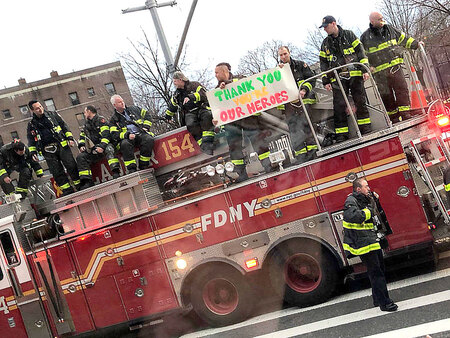 Most patients have COVID-19 or complications from COVID-19, and every day has its highs and lows. New York City is one of the hardest hit metropolitan areas in the country, with nearly 80,000 confirmed cases of COVID-19 as of April 9.
Most patients have COVID-19 or complications from COVID-19, and every day has its highs and lows. New York City is one of the hardest hit metropolitan areas in the country, with nearly 80,000 confirmed cases of COVID-19 as of April 9.
“You’re not seeing everyday sickness,” Blackmon said. “You have really great teamwork, and everyone is going to help out as much as they can, but you’re stretched thin and it’s sometimes hard to cope. It’s mentally trying, as well as physically and emotionally, and that takes its toll.”
There are some bright spots in the days, however. The city has come together to thank health care workers almost every night.
“Health care is a crazy family, and I’m glad I’m able to help. Everyone up here has been absolutely fantastic,” she said. “The fire department and first responders are sending us off almost every night, and New York City, they cheer almost every night at 7-o-clock.”
New York has received a high response rate to its call for more health care workers. She encourages anyone considering a new assignment in a hard-hit area to give the process a lot of thought.
“First, pray about it. God’s definitely not going to lead you wrong, and just go where your heart is leading you,” she said. “Do what you feel led to do. Alabama still needs help and needs help in local communities, so if that’s where your heart is leading you, stay and help there. No matter where you are, the experience will change you, for sure.”
When she chose to become a travel nurse, Blackmon didn’t expect to serve in the middle of a pandemic, in the middle of a crisis, in one of the nation’s hardest hit cities. The process has been eye-opening, but she’s thankful that she can help.
“I felt confident in my skills coming up here, but we’re also finding really creative ways to get around the lack of supplies,” Blackmon said. “I have become even more confident in my skills, and I think the UAB School of Nursing prepared me so well for situations like this. I’m also getting encouragement from my nursing school professors, and that has truly been a blessing.
“To everyone who has shown support, just know it means so much to us up here,” Blackmon continued. “I’ve been sharing letters I’ve received, little notes and Facebook posts. Just knowing that we have the support of our local communities means the world to us. And for those who are at home, we just ask that they do their part to stop the spread.”

